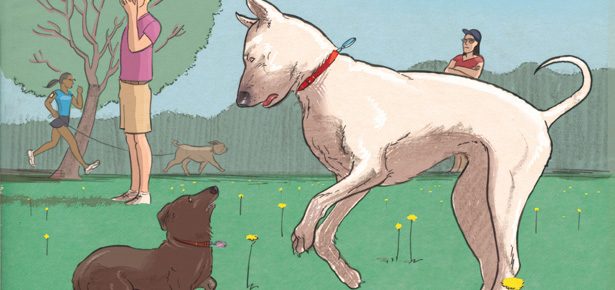

Does a Dog’s Personality Change Over Time?
Like owner, like dog? Does your personality influence your dog's?
Curious If Your Dog's Personality Has Changed?
I was at a reception following a Psychology Department lecture from a visiting scholar when I was approached by one of my colleagues. She was excited because she had just read a scientific report by a team of researchers headed by Rodica Damian at the University of Houston, could it be applicable to a dog personality too? They had collected data on the personalities of a large group of people at age 16, and then tracked them down 50 years later, when they were aged 66. Their goal was to test the personalities of these individuals again to see if there were any changes. What they found was that human personality does change with age, and it often changes in ways that are easy to predict. According to their data, you can reasonably presume that a 66-year-old will be more conscientious, more agreeable, and more emotionally stable than they were when they were adolescents. My colleague owns a dog, whom she is very fond of, and she wanted to know whether there were similar studies that looked at age-related changes in a dog's personality.
The systematic investigation of a dog personality is relatively recent and there are not all that many studies that have been published. At one point I had collected a large amount of personality data on more than 1,000 dogs and that formed the basis of my book, Why Does My Dog Act That Way. However, even though I looked at a lot of different variables, I did not collect data on how the canine personality changes with age. So, I promised her that I would see if I could find any recent studies that might answer her question.
I did find a few published articles which suggested that a dog's life history and his owner's personality might influence a dog's personality, which, of course would lead to the conclusion that there should be age-related changes in personality, but most of the scientific literature mentioned personality changes over the dog's lifespan only in brief comments. I was just about to give up when I came across an article which was published in the Journal of Research in Personality. It is by William Chopik and Jonathan Weaver, who are in the Department of Psychology at Michigan State University in East Lansing.
Their large study gathered data on 1,681 dogs and included over 50 different breeds. Dog owners were asked to fill out a questionnaire to describe the personality of their pets. The questionnaire was designed to measure five dimensions of dog personality: fearfulness, aggression toward people, aggression toward animals, activity or excitability, and responsiveness to training. In addition, the dog owners also completed a second questionnaire measuring their own personality. This gave data on the five major factors in human personality.
Psychology students are taught how to remember these five factors through the use of the acronym OCEAN—the letters of the word stand for Openness to experience, Conscientiousness, Extraversion, Agreeableness, and Neuroticism.
This particular study was one of those pieces of research where the authors wanted to answer several complex questions, so they looked at a host of different variables. As is typical when an investigation casts a very large net, the investigators are forced to use some highly complicated statistical analysis procedures which makes it difficult for the average reader, at least those who might lack any statistical training, to understand. However, embedded in their often-confusing tables of results was the information my colleague was looking for—along with a few other interesting findings.
One surprise in the data was the personalities of the dogs showed intriguing parallels to the personalities of their owners in four out of the five dimensions. Extraversion refers to the personality characteristic of being energetic, sociable, outgoing, and active. Conscientiousness refers to a predisposition to be organized and dependable, to show self-discipline and to complete tasks that you are assigned. Agreeableness is marked by friendliness and cooperation as opposed to being suspicious and antagonistic. Neuroticism is associated with the tendency to be prone to psychological stress and to often experience unpleasant psychological emotions, such as fear and anxiety. The researchers, comparing the personalities of dogs to the personalities of their owners, reported:
“Some of the most intriguing results found were instances of personality ‘compatibility’ between owners and their dogs. For example, extraverts rated their dogs as more active/excitable; conscientious owners rated their dogs as more responsive to training; agreeable owners rated their dogs as less aggressive; neurotic owners rated their dogs as more fearful.”
It is possible that the similarities between dogs and owners come about over time simply because the canine and human live in the same environment and have shared experiences. Alternatively, it may just be that people select dogs that have personality characteristics which parallel their own.
Returning to the question that my colleague asked, this study shows that there definitely are systematic changes in the dog's personality over time, much as there are in humans. Perhaps the most predictable outcome has to do with the activity and excitability levels in the dogs. As you might expect, younger dogs were more active and excitable than older dogs and the decrease in activity level occurred as a slow, steady, but consistent trend over the lifespan.
The two measures of aggression, namely aggression toward people and aggression toward other animals, both rose and fell in an age-related manner. For these aspects of canine personality, the trend lines indicated that there was a peak in aggression in dogs six to eight years old. Younger and older dogs showed lower levels of aggression both to people and other animals.
One of the findings I found to be most surprising had to do with responsiveness to training. I think that most people who work with dogs feel that dogs are most trainable when they are young and that trainability decreases in older dogs; however, these new results suggest that a dog's responsiveness to training rises steadily from puppyhood and reaches a peak between six and eight years before beginning to decline. The rise in trainability seems to have to do with the fact that young dogs are more excitable and distractible which gets in the way of their training. Beyond this optimal age, the decline in the older years is no sharper than the rise in trainability, which was observed from puppyhood to middle age. In other words, you can, in fact, teach an old dog can new tricks, and he will learn at the same rate as he did when he was a puppy.
Additionally, several of the findings in the research indicated that dog obedience training has a favourable effect on the personality of dogs. If a canine receives obedience training and the owner is happy during those sessions, the dogs are more likely to have positive personality traits. For example, obedience-trained dogs show less aggressiveness toward people or other animals. But perhaps the most striking result has to do with fearfulness (the canine equivalent of human neuroticism). Generally speaking, the tendency to show fear and anxiety is the one trait that rarely changes with age in dogs. However, there is an exception, and that is found in those dogs who received dog obedience training—obedience trained dogs showed a marked reduction in their overall fearfulness.
William Chopik summarized their search findings saying, “We expected the dogs' personalities to be fairly stable because they don't have wild lifestyle changes humans do, but they actually change a lot.” Knowing how the canine personality changes over their lifespan can help us with our relationships with our dogs. Understanding that our wildly excitable and difficult to train two-year-old dog will begin to calm down and will become more trainable over the next few years can be a great comfort and a stress reducer for dog owners. And advancing age definitely shouldn’t be used as an excuse for a lack of training!
Related Reading: What Your Dog Says About You!
Join the newsletter and never miss out on dog content again!
"*" indicates required fields
By clicking the arrow, you agree to our web Terms of Use and Privacy & Cookie Policy. Easy unsubscribe links are provided in every email.





